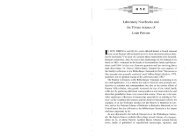Ideas for a Philosophy of Nature
Ideas for a Philosophy of Nature
Ideas for a Philosophy of Nature
You also want an ePaper? Increase the reach of your titles
YUMPU automatically turns print PDFs into web optimized ePapers that Google loves.
14 <strong>Ideas</strong><strong>for</strong> a <strong>Philosophy</strong> <strong>of</strong>Natu:Introduction15thing, which is itself caught up in the series <strong>of</strong> causes and effects, and isitself, together with the entire system <strong>of</strong> ideas, a mere result <strong>of</strong> themanifold effects which impinge upon me from without; in short, supposeI am myself a mere piece <strong>of</strong> mechanism. But what is caught up inmere mechanism cannot step out <strong>of</strong> the mechanism and ask: How hasall this become possible? Here, in the midst <strong>of</strong> the series <strong>of</strong> phenomena,absolute necessity has assigned to it its place; if it leaves this place,it is no longer this thing. It is inconceivable how any external causewhatsoever could affect this self-dependent being, whole and completein itself.In order to be able to philosophize, there<strong>for</strong>e, one must be capable<strong>of</strong> asking that very question with which all philosophy begins. Thisquestion is not such as one can, without further ado, address to others.It is one brought <strong>for</strong>th freely, a problem self-given. That I am capable<strong>of</strong> posing this question is pro<strong>of</strong> enough that I am, as such, independent<strong>of</strong> external things; <strong>for</strong> how otherwise could I have asked howthese things themselves are possible <strong>for</strong> me, in my consciousness? Onewould there<strong>for</strong>e have to think that anyone who so much as raises thisquestion is by that very fact refusing to explain his ideas as effects <strong>of</strong>external things. But this question has fallen among those who werecompletely incapable <strong>of</strong> devoting themselves to it. As it passed intotheir mouths, it also took on another sense, or rather, it lost all senseand meaning. They are beings who know themselves in no other waythan so far as laws <strong>of</strong> cause and effect have power and dominion overthem. I, in that I raise this question, have exalted myself above theselaws. They are caught up in the mechanism <strong>of</strong> their thinking andrepresenting; I have broken through this mechanism. How wouldthey wish to understand me?One who <strong>for</strong> himself is nothing other than what things and circumstanceshave made him, who, without dominion over his own ideas, isseized by, and dragged along with, the stream <strong>of</strong> causes and effectshowwill he wish to know whence he comes, or whither he goes, orhow he has become what he is? Does the wave know this, that driveshence in the stream? He has not even the right to say that he is a result<strong>of</strong> the collective effect <strong>of</strong> external things; <strong>for</strong> in order to be able to saythis, he must presuppose that he knows himself, that he is there<strong>for</strong>ealso something <strong>for</strong> himself. But this he is not. He exists only <strong>for</strong> otherrational beings - not <strong>for</strong> himself-is a mere object in the world; and it isadvantageous <strong>for</strong> him and <strong>for</strong> science that he should never hear <strong>of</strong>anything else or imagine anything other.From time immemorial the most ordinary people have refuted thegreatest philosophers with things understandable even to children andstriplings. One hears, reads, and marvels that such common thingsunknown to such great men and that people admittedly so insigntcould master them. It does not occur to anybody that perhapshilosophers were also aware <strong>of</strong> all that; <strong>for</strong> how else could theyswum against the stream <strong>of</strong> evidence? Many are convinced that, if he could only have read Locke, would have gone <strong>of</strong>fashamed;a one believes that even Leibniz, if he arose from the dead to go toI <strong>for</strong> an hour with him, would be converted, and how manynhorns have not sung triumphal songs over Spinoza's grave?hat was it, then, you ask, that drove all these men to <strong>for</strong>sake theon ways <strong>of</strong> thinking <strong>of</strong> their age and to invent systems opposederything that the great mass <strong>of</strong> people have always believed and'ned? It was a free inspiration, which elevated them into a spheree you no longer even understand their task, while on the othermany things became inconceivable to them, which seem veryle and understandable to you.zwas impossible, <strong>for</strong> them, to join and bring into contact thingsh, in you, <strong>Nature</strong> and mechanism have always united. They wereunable to deny the world outside them, or that there was a mindin them, and yet there appeared to be no possible connectioneen the two. To you, if you ever think about these problems,can be no question <strong>of</strong> converting the world into a play <strong>of</strong> con,or the mind within you into a dead mirror <strong>of</strong>things,"ng since, the human spirit (still youthful, vigorous and freshthe gods) had lost itself in mythology and poetic fictions aboutorigin <strong>of</strong> the world. The religions <strong>of</strong> entire peoples were foundedhat conflict between spirit and matter, be<strong>for</strong>e a happy genius-thephilosopher-discovered the concepts in which all succeedinggrasped and held firm both ends <strong>of</strong> our knowledge. The greatesters among the ancients did not venture beyond this contradic. Plato still sets matter, as an other, over against God.s The first, with complete clarity, saw mind and matter as one, thought andnsion simply as modifications <strong>of</strong> the same principle, was Spinoza.system was the first bold outline <strong>of</strong> a creative imagination, whicheived the finite immediately in the idea <strong>of</strong> the infinite, purely asand recognized the <strong>for</strong>mer only in the latter.» Leibniz came, and1 It was a free inspiration which they gave themselves, and which raised them towhere the leaden wings <strong>of</strong> your imagination are unable to carry you. After they. had raised themselves thus above the course <strong>of</strong> <strong>Nature</strong>, much became inconceivableto them, which to you is all too intelligible. [First edition.]a to trans<strong>for</strong>m mind into matter [First edition.]9 as a self-subsistent being [First edition.]'0 <strong>of</strong> a creative imagination, which went over from the infinite in idea to the finite inintuition. [First edition.]



